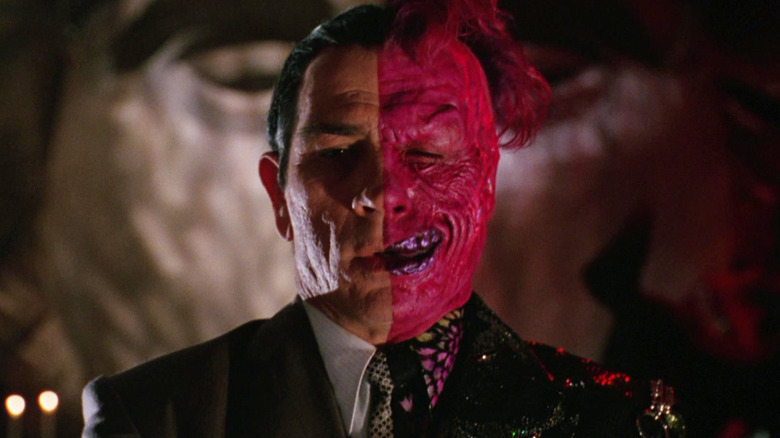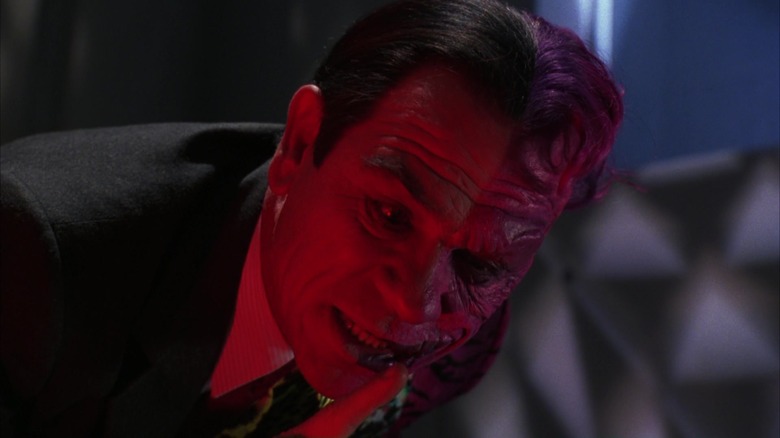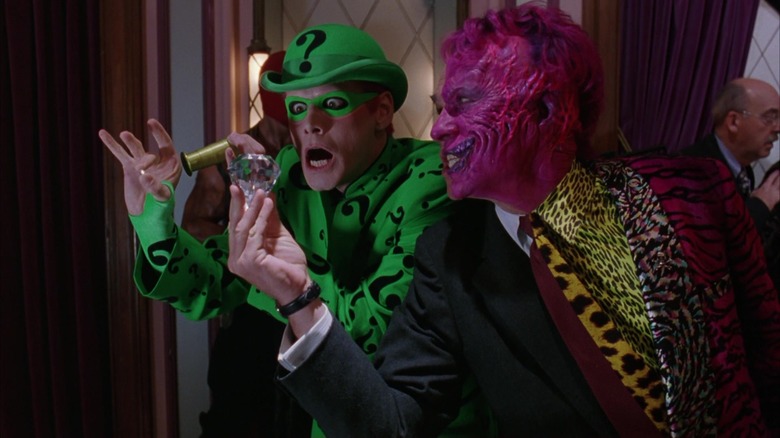Tommy Lee Jones Predicted Modern Hollywood's Main Problem While Making Batman Forever
There's a scene in "22 Jump Street" where the blundering cops Greg Jenko (Channing Tatum) and Morton Schmidt (Jonah Hill) meet with their boss, Deputy Chief Hardy (Nick Offerman), to explain their latest bungled investigation. Informing them he's putting them back in the rebooted undercover Jump Street program, Hardy comments on the shocking success of the revived police operation, which has recently seen its budget doubled. "As if spending twice the money guaranteed twice the profit," he chuckles.
This meta-nod to the first "21 Jump Street" film — which refashioned the original dramatic '80s TV procedural of the same name as a raunchy, self-reflexive action-comedy — becoming an unexpected critical and commercial hit is not even remotely subtle, nor is it intended to be. It's also clearly assumed viewers will innately understand the sly reference to recent Hollywood spending habits — namely, that studios tend to pour way more money into sequels and spinoffs than the films that came before them. For the record, that wasn't the case with "22 Jump Street," which had a $50 million budget versus its predecessor's $42 million price tag (lest anyone think I'm impugning the honor of the "Jump Street" sequel).
We've seen Hollywood's bad practices bite it in the caboose many a time since "22 Jump Street" opened in 2014, although it's been especially rough going in 2023 due to the sheer number of sequels with irresponsibly inflated budgets. However, nearly two decades before Offerman did his Ron Swanson thing in director Phil Lord and Chris Miller's cheekily irreverent buddy cop film, another curmudgeonly sage in the form of Tommy Lee Jones foresaw this very issue becoming a serious problem.
We're a corporate family
After Tim Burton's grotesquely gothic sequel "Batman Returns" fell well short of the director's 1989 "Batman" at the box office, Warner Bros. decided it was time to shake things up. Enter Joel Schumacher's 1995 follow-up "Batman Forever," which re-imagined Gotham City as a Baroque neon-lit metropolis far removed from the Expressionist backdrop that was Burton's Gotham and leaned harder into the franchise's campier trappings (as well as its underlying queerness). The film had a $100 million budget, which was $20 million more than "Returns" and would amount to $200 million adjusted for inflation in 2023.
It was a huge film, in other words, and Jones (who starred as the crusading lawyer turned erratic criminal Harvey Dent, aka Two-Face) knew it. It was also a reunion for the actor, who had only just worked with Schumacher and WB on "The Client" one year prior and sang their praises in the official "Batman Forever" movie book:
"It's been a lot of fun. I've known Joel Schumacher for 20 years and I've done two movies with him. Ve Neill and Eddie Henriques are doing the makeup, and they've been old pals for a long time. And I love working for Warner Bros. I hope it doesn't sound specious to refer to a giant corporation like Warner Bros. as a family, but they are one."
As Jones noted, WB has always been a corporate monster, yet it also used to have a reputation for being filmmaker-friendly. It's why directors as worlds apart as Clint Eastwood, Neil Jordan, and Oliver Stone consistently collaborated with the studio in the '90s, as did Schumacher. That decade also saw WB releasing auteurist films like "Malcolm X," "The Hudsucker Proxy," and "Eyes Wide Shut," in-between more broadly commercial fare — a far cry from David Zaslav's current regime.
'If a movie gets bigger than this, it's a mistake'
Continuing, Jones expressed how much he enjoyed working on a project the size of "Batman Forever." At the same time, he was wary of Hollywood's ever-ballooning budgets and felt it unwise to go even bigger in the future:
"I also like the scale of this movie, which is, on the scale of things, huge. If a movie gets bigger than this, it's a mistake, and this is not a mistake. We're doing all this on purpose. It's Batman, after all. What further explanation could one possibly want? It's a mountain you want to climb because it's there."
Jones' warning echoes loudly in 2023, which has already seen tentpoles like "The Flash" and "Indiana Jones and the Dial of Destiny" flame out financially with budgets reaching upwards of $300 million. Meanwhile, even costlier sequels like "Fast X" and "Mission: Impossible — Dead Reckoning Part One" have only just managed to avoid becoming disasters thanks to the global box office, whereas films like "Ant-Man and the Wasp: Quantumania," "The Little Mermaid," and "Transformers: Rise of the Beasts" have all failed to firmly break even during their theatrical runs, due to their extravagant budgets.
The takeaway? Well, for one, Hollywood needs to ease back on the sequels and reboots and go back to innovating. As for studios' exorbitant spending, some of that can be attributed to the pandemic and the added measures put into place to ensure the safety of their employees. That being said, it's not like executives trying to spend their way into profitability was something that began with Covid, as Jones' comments and the aforementioned "22 Jump Street" joke remind us. Luckily, if history is any indicator, cinema tends to flourish creatively whenever Hollywood's old tricks stop working for it.


